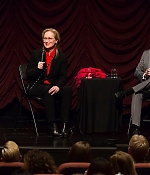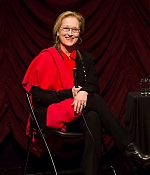|
Simply Streep is your premiere source on Meryl Streep's work on film, television and in the theatre - a career that has won her the praise to be one of the world's greatest working actresses. Created in 1999, we have built an extensive collection to discover Miss Streep's body of work through articles, photos and videos. Enjoy your stay.
|
Celebrating
25 years
of SimplyStreep
|
The audience erupted into laughter until Streep continued to say she had always been interested in people and wanted to work as an interpreter for the United Nations after her mother drove her to the headquarters in New York. “I thought it was vain to want to be an actress,” Streep said. ”Plus, I thought I was too ugly to be an actress. Glasses weren’t fabulous then.” Streep received her undergraduate degree from Vassar College and decided to apply to drama school at Yale. She signed up for law boards in her third year because she still didn’t believe she had the right to be an actress, Streep said. “Many of my friends woke up at 3 years of age and said, ‘I have to be on stage.’ I never had that,” Streep said. “I’ve always been an omnivore, and I actually fell into the profession that fed all my appetites.” Streep said she slept through the law boards because she had a performance the night before, and the rest was history. She graduated and quickly got work. She said the day she paid off her student loans was the happiest day of her life. After graduation, Streep appeared in several theater productions and later made the transition to film. She said every role is different and requires something new. “The whole movie happens in a moment between you and who you’re working with,” she said. “You have no idea what they’re going to bring, so the preparation only goes so far. You have to throw away all your preconceived ideas.” One way she connects with her characters is by being empathetic for the person she is playing. “It is possible for people of very diverse backgrounds to feel the feelings of someone not remotely like them,” Streep said. “Even crossing the gender line and the age line, even all the things that divide us. You can still feel what that person feels. That’s such an interesting, underused quality human beings have.” That gender line has been clouded in more recent times, Streep said. Now, women lead big corporations like Sony and Universal.
“For young women, I would say, don’t worry so much about your weight. Girls spend way too much time thinking about that, and there are better things. For young men, and women, too, what makes you different or weird, that’s your strength. Everyone tries to look a cookie-cutter kind of way and actually the people who look different are the ones who get picked up. I used to hate my nose. Now I don’t. It’s okay.”
“The business is changing,” Streep said. “That’s a really big difference from when I started. There was almost an impenetrable line of suits.” Her advice for women acting today is to not worry too much about their weight. “Girls spend way too much time thinking about that,” she said. For all actors, Streep advised finding the thing that’s weird about them and using it to their advantage. Directors pick up the people who are different, Streep said. This coming year, Streep will appear in three different films — “The Giver,” “Into the Woods” and “The Homesman.” Despite all of the fame and awards, Streep said she feels lucky for her opportunities. “I feel very, very guilty when the litany of my awards is trotted out because I feel like there are many women my age, in our industry, who are plenty capable of the work I’ve been doing,” Streep said. “The only reason I have a career at 64 is because I had hits late in life.” The event ended with a discussion of Streep’s role in the 2015 movie, “Suffragette,” about the heavy violence that occurred during Britain’s women’s suffrage movement. Streep watched the only video available of her character, Emmeline Pankhurst. Because she had never seen herself on camera or video, Pankhurst’s movements were not self-aware. “She has a demeanor you will never be able to achieve,” Streep said. “You’ve all been photographed and know what you seem like. You’re used to your outer performance.” Streep found the video interesting because nothing was designed about Pankhurst’s movements. “You could see the difference between people now who are so used to seeing themselves as objects and the people who are so in the gestalt of their bodies,” Streep said. “It taught me something about how to strive for unselfconsciousness.”













